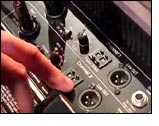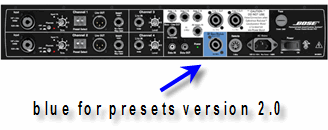Difference between revisions of "Presets/Model I and Classic"
m (formatting so details about finding presets are linkable) |
m |
||
| Line 84: | Line 84: | ||
== Instructions for Using the Downloadable Preset version 2.0 == | == Instructions for Using the Downloadable Preset version 2.0 == | ||
[http://www.bose.com/controller?event=VIEW_STATIC_PAGE_EVENT&url=/musicians/popup/software_download_2.jsp&ck=0 Instruction] | [http://www.bose.com/controller?event=VIEW_STATIC_PAGE_EVENT&url=/musicians/popup/software_download_2.jsp&ck=0 Instruction] | ||
| + | * [http://www.bose.com/pdf/musicians/software_downloads/presets2p0.zip presets2p0.zip] | ||
---- | ---- | ||
Revision as of 16:21, 7 April 2007
Presets
Contents
What Version Do I Have
Q: I just got a new System, does it have the latest presets? A: Quoting Kyle-at-Bose: "You can easily tell if you have one of the newer power stands- those that come preloaded with Presets 2.0- by looking at the rear I/O panel. If the Amp 3 Output connector area (where the B1s plug in) is a light blue color, then the Presets 2.0 have been preloaded at the factory."
Upgrading your Presets
If you don't have version 2.0 presets see: Upgrade Your Software
And if you have difficulty see: Software Upgrade Troubleshooting
What do the Presets Do?
See
- Presets 2.0/Cliff Notes notes about the specific presets
Cliff-at-Bose
Cliff-at-Bose had these general comments about working with the presets. [1] "They were all developed to make CLOSE VOCALS (as in eat-the-mic) sound more natural through our system. When you back way off, say 6 inches or more, all bets are off. The same goes for even close miking of musical instruments. Actually, close miking of a Dobro might be fine in the flat setting, maybe turn up the HF on the remote for some sparkle. In the studio, a B57 sounds pretty useful 4-6 inches away from a guitar. Stay away from the sound hole if the sound gets too dark. Too much signal from the sound hole will also encourage low-mid feedback. As a hunch, try preset 35, assuming you recently purchased and these are v2 presets. This is probably the most radical one in the catalog, but will give you an idea of the extremes. It's for a very midrange-heavy electric guitar (PRS) to be played direct. Also, try all the presets on a spare evening alone. Lots of tone variations here. Forget the titles and just listen.
Also, on the mics for singing, try presets 01-04 as an alternative to the ones we recommended for your mics.
No one really knows the sound you want but you, when you hear it. So experiment with the presets and turn the knobs. Write back and let us know your results. Lots of players like you will benefit from your results."
Cliff-at-Bose had more to say [2]
The mic pre's are really good ones, recording quality. Compare them to anything. You'll be amazed how they stack up to tweakier high-dollar units. We worked real hard on this and we're happy we did.
About the presets: No mic that I know of sounds good for close vocal, even for recording for that matter. All our presets compensate for this. A lot of these mics sound a lot more natural when you back off a foot or so from them. Of course this is true in the studio too. No one does this for a live performance (backs very far off the mic) since you want to maximize gain before feedback by eating the mic. And so then you get funny sound and so then you need our presets to make it natural.
If you need more channels for all-the-same mics, use a small mixer into channels 1 or 2. The presets work on line levels too, so a mixer full of mics using the recommended preset will all sound great. Use the presets always. They are one of the really great features of our system and they really give you a no-brainer great-sounding place to start for any amplification.
Steve-at-Bose
Steve-at-Bose [3] said:
Think of it this way, if you work at Shure, Audix or any company making microphones you have no clue what speaker your customer will use to reproduce sound with your mic. So you voice it for a "best fit" system (or systems) and hope the market (or a part of it) agrees with your deicsion(s).
Now, imagine you knew EXACTLY what speaker your customer was going to use your mic with. Let's say, a Cylindrical Radiator(r) speaker Smile. Well, then you could voice the mic to create a very nice response.
That's what we can do with presets. We can create an EQ curve that attempts to make the mic sound very natural since we know how the speaker and mic will work together. It's that simple.
The good news is that 00 is flat which means the mic will sound like it is "supposed" to sound (according to the mic manufacturer).
Then there is the artistic choice. If you like the SM58 preset for an OM5 ... well, go for it. I've heard a few guitar players say they love the Accordian preset ... go figure.
I hope that helps to de-mystify presets. No voodoo or making things bigger and badder. Just choices. You can use the Bose choice (mic preset) the mic manufacturers choice (flat) or your own (try your voice with the accordion preset). Oh, and there's the 3-band EQ.
Which Preset Should I Use?
Presets - Finding What Works
Presets - Finding What Works - This is a step-by-step walkthrough.
Presets (v2) Used By Owners
Presets (v2) Used By Owners - This is list of inputs and presets that are not on the official list, contributed by L1 owners.
Print a copy
Presets 2.0
Other Languages
Preset 2.0 - Una panoramica - Italian [4]
ToneMatch™ Presets
- ToneMatch™ Presets/Taylor - Available Now
- Audix Microphones Announced
- Breedlove Guitars Announced
Custom Instrument Presets
Please see the discussion on The Bose® Musicians Community Message Boards
Instructions for Using the Downloadable Preset version 2.0
- ↑ Cliff-at-Bose describes the presets in the Bose® Musicians Community Message Boards
- ↑ Cliff-at-Bose More about the presets and the Preamps in the Bose® Musicians Community Message Boards
- ↑ Steve-at-Bose Describes Them in the Bose® Musicians Community Message Boards
- ↑ Preset 2.0 - Una panoramica - Italian - Original post in the Bose® Musicians Community Message Boards - Thanks to Marco-at-Bose-Europe


